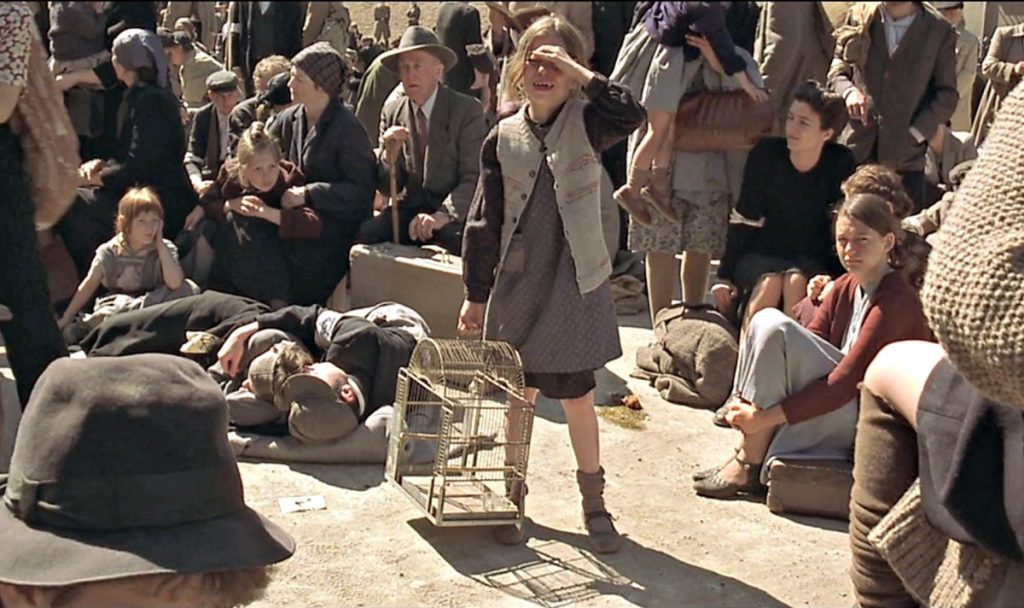Wear’s War Editor’s Comment: The Pianist was another Hollywood blockbuster bringing the horrors of WWII and the suffering of Jews to light for the price of a movie ticket. It received standing ovations from the Hollywierd elite as it won various Academy Awards. Most memorable was mother of three girls, Meryl Streep’s almost fanatical standing ovation for the absent Roman Polanski who won Best Director.
Roman Polanski, a convicted pedophile who drugged and sodomized a 13-year-old girl, brings to the big screen in The Pianist the real horrors and suffering of Polish Jews in WW2. It is evident that Polanski is driven by an overwhelming desire to achieve justice for Jews. That’s why he ran away from America, if they put him in prison for abusing a child, he couldn’t bring his authentic honesty to the big screen or make lots of money. However, Polanski has the proverbial Get-Out-Of-Jail Card, he too is a “survivor”!
Polanski… was eight when the Nazis arrested his parents in Krakow’s Jewish ghetto — sending them to concentration camps from which his mother never returned. He fled the ghetto and roamed the countryside, trying to survive, helped by Catholic Polish families, in a country occupied by German troops. The experience lent a gripping autobiographical authenticity to his 2002 movie “The Pianist”, the tale of a young Jewish man trying to evade the Nazis in occupied Warsaw. His youthful observation of the human capacity for cruelty shaped Polanski’s psychologically wrought work from the start.
We’ve discussed the fascinating creativity of “survivor” eyewitness testimony in previous articles here, here and here. However, perhaps it is different with Polanski?
Most certainly Polanski touches our children hearts and shocks our souls with his own childhood memories inserted into the movie. Like witnessing his father being slapped by a Nazi, apparently for not walking in the gutter.
Unfortunately on the day Polanski was casting German and Nazi roles, almost all the attractive and intelligent looking Germans were busy. So he had to resort to hiring many rather thuggish and dim witted looking actors to play Germans. Polanski’s use of color was lauded, the film starts with happy Jews and bright colors, then switches to somber monochromatic coloring reflecting the sadness and horror when the Nazis appear (so don’t adjust your TV, it’s not broke just moody). Finally, let us all thank Poland for refusing to extradite Polanski to America to face justice an antisemitic prison sentence.

The Pianist Movie Review & Verdict On The Facts
By John Wear
 The movie The Pianist makes the following valid points:
The movie The Pianist makes the following valid points:
1) Germany attacked Poland on September 1, 1939. Great Britain and France declared war on Germany two day later.
2) Wladyslaw Szpilman, a Polish-Jewish pianist who is the protagonist of the film, hoped that Great Britain and France would aid Poland in its fight against Germany. However, the promised aid from Great Britain and France was not forthcoming. Germany and the Soviet Union quickly defeated Poland.
3) Warsaw became part of the National Socialist General Government. Jews were stripped of their rights and forced from their homes into the overcrowded Warsaw Ghetto.
4) The Warsaw Ghetto Uprising occurred in April 1943 and was a complete failure.
5) The Warsaw Uprising occurred in August 1944. The hoped for help from the Soviet army did not happen, and the Polish army was defeated while the city of Warsaw was almost completely destroyed from the fighting.
The movie The Pianist makes the following misrepresentations:
1) German soldiers in The Pianist are routinely shown as being stupid, cruel, brutal and childish. This caricature is flagrant and does not reflect the disciplined nature of most German soldiers and Germans in general.
I have discussed previously for example, how Elie Wiesel, whose autobiography Night written in 1956 helped him win the Nobel Peace Prize chose to evacuate Birkenau [Auschwitz II] and travel to Buchenwald Concentration Camp with the Germans rather than be liberated by the Russian army. It is unlikely that he would do so if the German soldiers were typically brutish.
Further, The Pianist fails to mention the fact that the atrocities against the German minority in Poland since early 1939 had been extreme.
The mass arrests, deportations, mutilations, and beatings of the last few weeks in Poland surpassed anything which had happened before.
Hitler invaded Poland in order to end these atrocities.
2) Similar to a scene in the movie Schindler’s List, a German soldier orders Jewish civilians to lie on the ground. The soldier then shoots all of them in the back of the head. As in Schindler’s List, the German soldier runs out of bullets and is forced to reload his gun to complete the killing of the Jewish civilians. Contrary to what is depicted in The Pianist, German officers and soldiers were not allowed to shoot innocent Jewish civilians with impunity.
Consider another example I previously discussed concerning Dr. Rascher in the Dachau Concentration Camp. When the German Authorities discovered the true nature of his human medical experiments he was arrested and executed.
3) The survival of Wladyslaw Szpilman in The Pianist is portrayed as a miracle. Szpilman was separated from his family by a friend in the Jewish Ghetto Police and not sent to Treblinka where he would have apparently been exterminated. Toward the end of the war, German officer Wilm Hosenfeld helped Szpilman hide in the attic of an empty house and supplied Szpilman with food. Such extremely unusual good fortune enabled Szpilman to survive the war.
However, in reality, large numbers of Polish Jews survived the war. This includes Roman Polanski, the Polish-Jewish director of The Pianist. Polanski was born August 19, 1933, and was only six years old when Germany invaded Poland. According to Wikipedia,
Polanski spent the next six years mostly on his own, trying to survive the ongoing Holocaust”.
Polanski also miraculously survived the so-called Holocaust even though he was a very young child on his own throughout the war.

4) The Pianist never explains why Germany attacked Poland. Germany is falsely made to appear to be the sole aggressor nation in World War II. As explained in Germany’s War, and in a previous article here, Poland accepted an offer from Great Britain on March 30, 1939, that gave an unconditional unilateral guarantee of Poland’s independence. The British Empire agreed to go to war as an ally of Poland if the Poles decided that war was necessary.

Great Britain for the first time in her history had left the decision whether or not to fight a war to another nation. Britain’s guarantee to Poland was binding without commitments from the Polish side. Despite its unprecedented nature, British Foreign Secretary Lord Halifax encountered little difficulty in persuading the British government to accept Great Britain’s unilateral guarantee of Poland.
Great Britain’s blank check to Poland encouraged Poland to commit outrageous atrocities against its German minority. Germany invaded Poland to end these Polish atrocities. (Source: Germany’s War, pp. 130-144).
5) The Pianist implies that Germany was responsible for the Warsaw Uprising. In reality this uprising was initiated when Polish insurgent leader Gen. Bór-Komorowski used his 35,000 man Home Army to fight the Germans in Warsaw. The Home Army had expected to receive assistance from both the Red Army and the Western Allies; instead, it received almost no aid from either.
German SS units were assigned to end the uprising. The German plan was to recapture Warsaw district by district by driving out Polish citizens from every block and every house. In this manner the insurgents would be compressed into an ever constricting perimeter, with no insurgents to the German rear once they took a district. The Luftwaffe also played a role in the fighting, and attacks by German Stukas caused major damage.
The Warsaw Uprising failed because the Red Army offered no help to the Home Army. Some believe that Stalin refused to help the Polish Home Army because it was as adamantly anticommunist as it was antifascist. It was advantageous for the Soviets to let the German and Polish forces kill each other off and then have the Red Army move in. (Source: Germany’s War, p. 445).
Wears War Movie Verdict for The Pianist:

The Pianist is another in a long list of movies that supports the notion that Germany had a policy of genocide against Jews during World War II. Naturally, The Pianistreceived many awards, including best director for Roman Polanski. This comes as no surprise, since making movies about the so-called Holocaust is a key to Oscar success.
Source Article from http://www.renegadetribune.com/pianist-cinematic-masterpiece-criminally-evading-historical-facts/
 RSS Feed
RSS Feed















 October 11th, 2017
October 11th, 2017  Awake Goy
Awake Goy  Posted in
Posted in  Tags:
Tags: 













